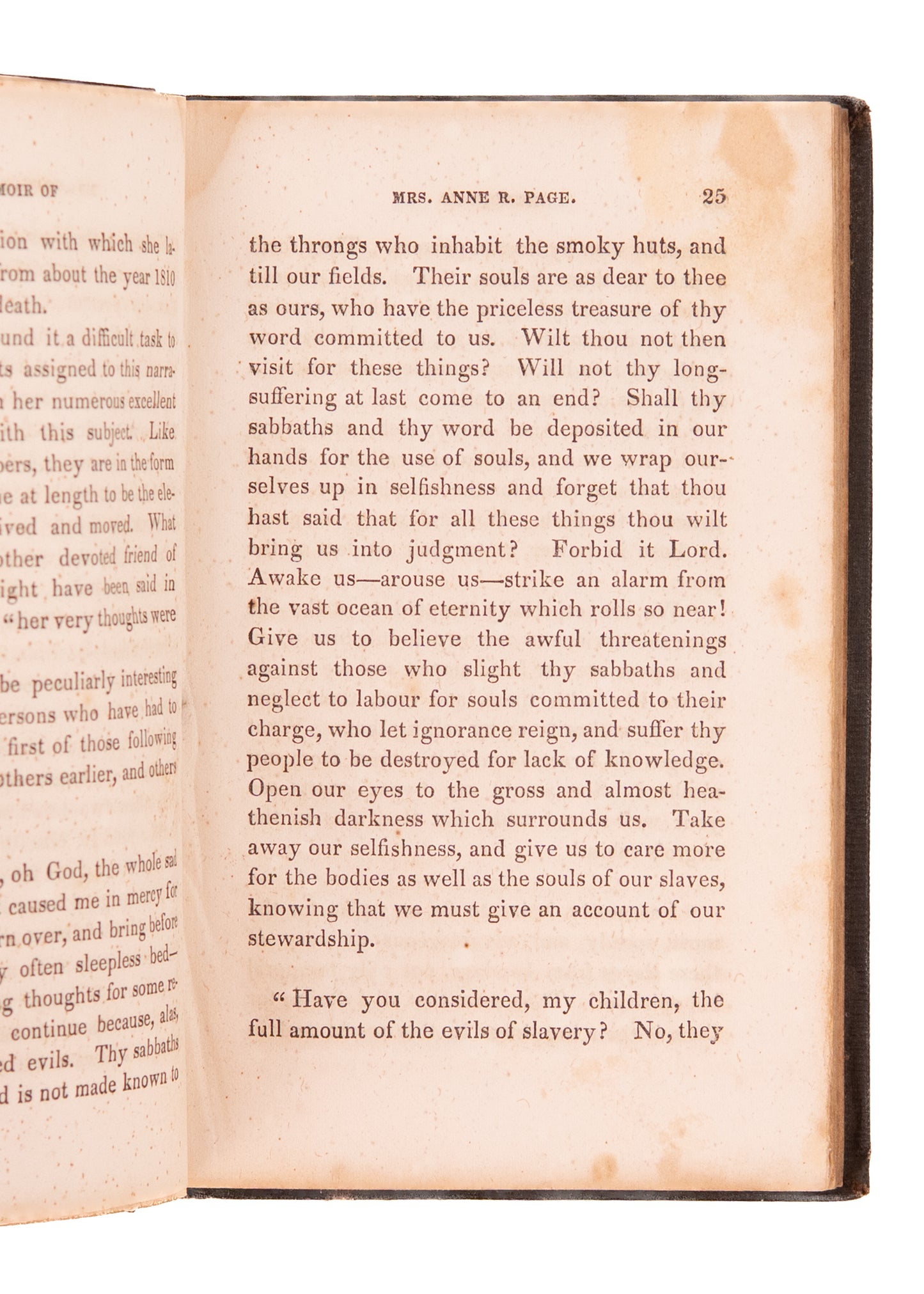Specs Fine Books
1844 EARLY FEMALE ABOLITIONIST. Memoir of Anne R. Page, Plantation Owner of Virginia.
1844 EARLY FEMALE ABOLITIONIST. Memoir of Anne R. Page, Plantation Owner of Virginia.
Couldn't load pickup availability
An important and inexplicably scarce memoir of early female abolitionist, Anne Randolph [Meade] Page [1781-1838]. Born in Fredericksburg, Virginia and born into a wealthy slave "owning" family, she married Matthew Page, a member of the Virginia House of Delegates, in 1799. They immediately moved into his home, Annfield, which he renamed in her honor. It was an expansive 2,000 acre working estate, maintained and "worked" by hundreds of slaves, making it one of the largest plantations in the region.
After what Anne would describe as a profound encounter with Christ, she immediately became an active proponent of immediate emancipation for all slaves, including a desire to free their own slaves immediately. Her husband disagreed and forbade it. Making the most of the situation, she devoted herself full-time to their education and spiritual and physical care, but she was overwhelmed with guilt. She records that she felt a distinct call from God to completely eradicate "the evil power of slavery," particularly in her own household. Her inability to free her slaves and effect the cause on a larger scale caused her deep distress, recording in her journal that she woke up every day and was every moment in despair.
The successful launch of the American Colonization Society in 1816 gave her some cause for hope. So persuaded was she of the Society's aims, she gained her brother, Bishop William Meade, and her eldest daughter, Sarah Page Andrews, to join her in her fight against slavery and support of the colonization of freed slaves in Liberia.
After the death of her husband, she immediately emancipated all of the family's slaves and paid for the preparation and transport of any who wanted to move to Liberia.
In her writings, Anne Page describes the defining religious experience which prompted her to support emancipation:
"On the Sabbath after church, I was going, according to the general custom, to dine out; but the spirit of God spoke better counsel, and enabled me to turn into a solitary home, without a white person near. This was the first time I had returned home on Sunday from a religious motive. I shut myself up in my room, where my soul was engaged with the thoughts of judgment and eternity. While thus engaged in my chamber, an old blind negro woman was led in, who was a dear child of God. We began a conversation in which she used expressions respecting entire confidence in Christ, which made an indelible impression upon my mind, being quite clear to me at this distant period. I think I owe her, under God, much of my religious joy in after years. Dark old creature, I often visited her in her cottage, and witnessed the evidences of her triumphant faith. She was a living example of Christ formed in the soul, the hope of glory."
[Anne Page - Colonization - Abolition - Slavery]. Andrews, Rev. C. W. Memoir of Mrs. Anne R. Page. Philadelphia. Herman Hooker. 1844. 101pp.
Good + to very good in original cloth with blind stamped boards and spine, gold titling to spine. A bit bumped and turned at corners, moderately foxed at prelims and rears. Else generally clean and solid with minor to moderate of foxing unevenly throughout.
Share












